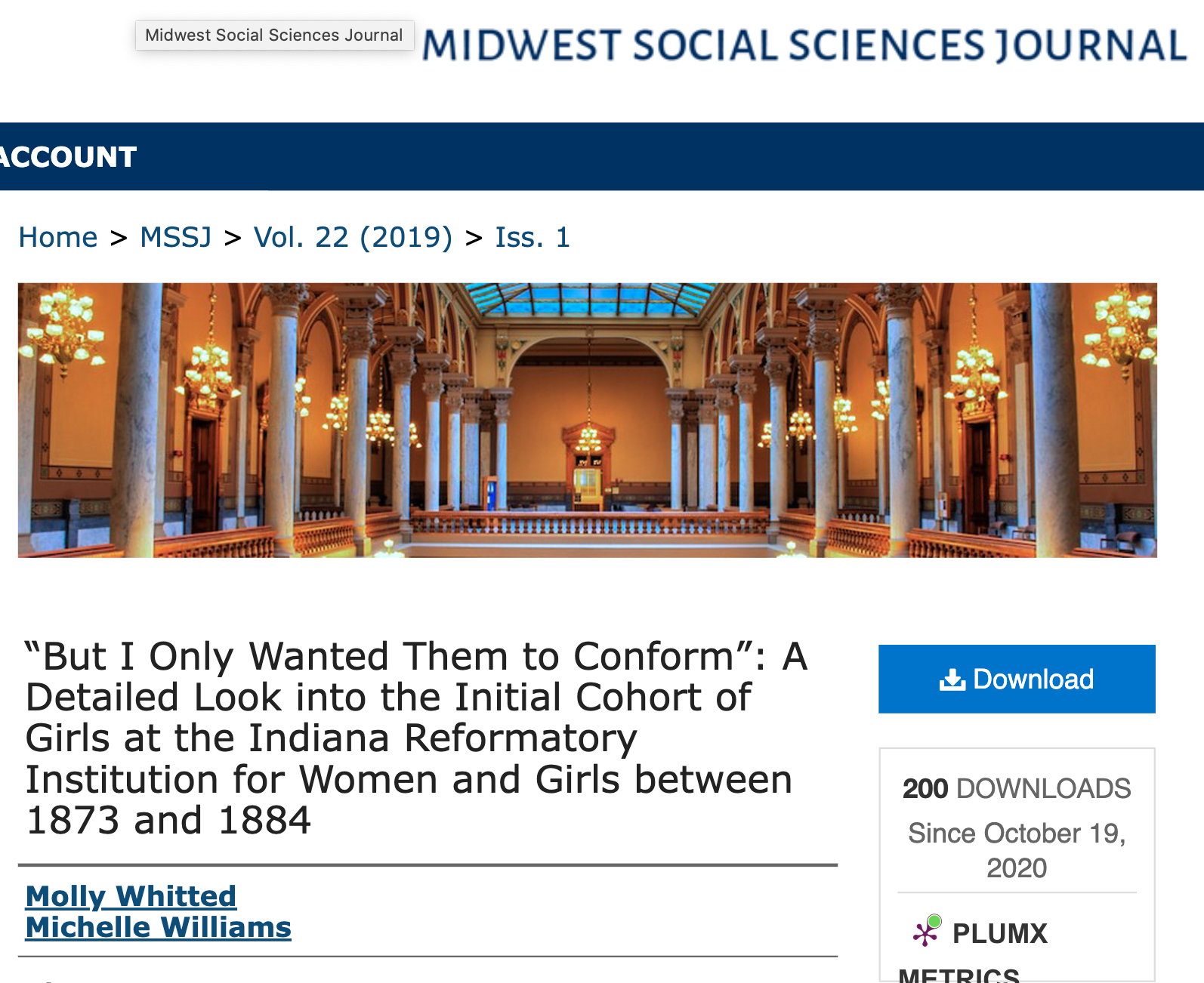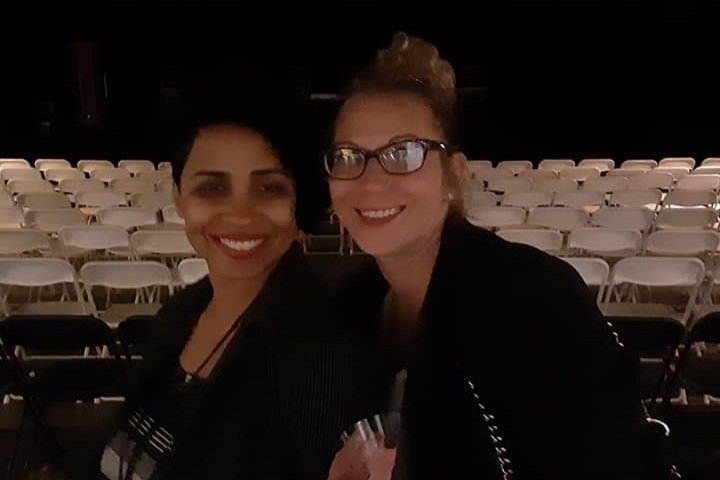Molly Whitted
I have had a deep interest in all things history, anthropology and archeology ever since I first watched Indiana Jones as a child. I began working towards a Bachelor's Degree in History at Indiana University - East in 2006. My studies were interrupted when I was incarcerated and sent to the Indiana Department of Correction. Yet, while at the Indiana Women’s Prison in Indianapolis, I had the good fortune to meet mentors, colleagues, and friends after being invited to join the IWP History Project.
My colleague Michelle Williams and I initially co-authored a paper entitled, “But I Only Wanted Them to Conform: a Detailed Look into the Initial Cohort of Girls at the Indiana Reformatory Institution for Women and Girls, Between 1873 – 1884.” The paper won honorable mention in the Peggy Seigel Award for best undergrad paper on Indiana history and was also later published in the 2019 Indiana Journal for the Academy of the Social Sciences. We also presented our research on this subject via video conferencing from prison.
I then focused my research on the history of eugenics, particularly in Indiana. I have spent the last six years researching and writing about a group of marginalized women who were sent to the Fort Wayne School for Feeble Minded Youth at the beginning of the 20th century and Indiana’s eugenics law that put them there. My research on this subject has been presented at:
National Conference for Higher Education in Prison; St. Louis, Missouri (2019)
Making and Unmaking of Mass Incarceration Conference; Oxford, Mississippi (2020)
Indiana Historical Society; Indianapolis, Indiana (2020)
After being released from prison, I enrolled at Indiana University/Purdue University in Indianapolis to continue my education. I was happy to make Dean’s List with Academic Honors several semesters in a row before my studies were interrupted once again–this time by the pandemic. I also worked with a grant from the Lumina Foundation, writing about the importance of higher education in prison.
I love all kinds of writing. While in prison I had a poem entitled “American’s Creed is Greed,” published in A Midwestern Review. I plan to continue my research on eugenics history in Indiana and eventually write my own book on the subject, as well as a series on my life’s experiences.

Scholarship
The Girls at the Indiana Reformatory for Women and Girls
Molly joined the History Project at IWP in 2016. She and Michelle Williams, another newcomer to the program, immediately volunteered to tackle the large amount of data that we had previously neglected on girls who were committed to the prison in the 19th century. They threw themselves into the project, painstakingly digitizing and analyzing information on every girl who entered the prison in the 19th century. That we know so much about this important group is due primarily to their efforts.
Michelle Williams and Molly Whitted in IWP classroom, 2017
Their paper, Quantitative and Qualitative Analysis of the Initial Cohort of Girls at the Indiana Reformatory Institution for Women and Girls, won honorable mention in a statewide competition for best undergraduate history paper in the state (beaten only by Christina Kovats’ paper on the origins of Indiana’s Magdalene Laundry). Molly and Michelle continued working on the project until they received the very rare honor as undergraduates of having their article, “But I Only Wanted Them to Conform”: A Detailed Look into the Initial Cohort of Girls at the Indiana Reformatory Institution for Women and Girls between 1873 and 1884, selected for publication by a peer-reviewed academic journal.
The chapter on “Jennie” in Who Would Believe a Prisoner? combines Molly and Michelle’s research on the girls at IWP with Kim Baldwin’s critique of the women who ran the reformatory and were profiting from the girls’ labor, Counterfeit Decency.
Eugenics and Indiana’s “Feeble-Minded Women”
After publication of her and Michelle Williams’ article on the girls at IWP, Molly’s interests shifted to the forgotten women of the Fort Wayne School for Feeble Minded and the shameful leading role that Indiana played in the Eugenics movement in the late 19th and early 20th centuries. In 1907, Indiana passed the world’s first forced sterilization law for those deemed unfit for procreation and sought to confine the so-called feeble-minded to prison-like institutions, often for life. Molly’s chapter on the “‘Feeble-Minded’ Women at Harper’s Lodge” is a rare glimpse into the fate of these women.
Molly has presented her research on eugenics to numerous academic conferences, including the Indiana Historical Society, the Indiana Association of Historians, the National Council for Higher Education in Prison, the Making and Unmaking of Mass Incarceration Conference, and the Indiana Academy of the Social Sciences. Here is her paper, The Confinement of Sexuality: Institutionalization as a Eugenic Tactic in Indiana’s Progressive Era, presented to the 2020 Hoosier Women at Work conference at the Indiana Historical Society.
Driving to the 2019 National Conference on Higher Education in Prisons in St. Louis, MO. Front row: Elizabeth Nelson and Monica Deck; Middle row: Molly Whitted and Kristina Byers; Back row Anastazia Schmid and Ray Cummins
Anastazia Schmid, Molly Whitted, and Elizabeth Nelson at the MUMI conference
At the MUMI (Making and Unmaking Mass Incarceration) Conference, Oxford, Mississippi 2019. L to R: Michelle Daniel Jones, Anastazia Schmid, Elizabeth Nelson, Molly Whitted, Monica Deck
Michelle Danielle Jones, Paméla Cappas-Toro, Anastazia Schmid, Monica Deck, Elizabeth Nelson, Molly Whitted, Andy Eisen at the MUMI conference, 2019
Elizabeth Nelson and Molly Whitted at the MUMI conference
In Molly’s words, “Being able to attend the NCHEP and MUMI conferences were some of the most uplifting experiences of my life. I learned so much from so many different brilliant minds. Perhaps most invaluable of all was the feeling of pride, accomplishment, and positivity that came from speaking at those conferences. Bringing to the present the silenced and all but forgotten experiences of the women I write about meant so very much to me because those women deserve to have a voice.”
Reforming Higher Education in Prison
Molly was one of the authors of Spotlight on Indiana: Barriers to Higher Education for Incarcerated and Formerly Incarcerated Students, a hard-hitting report on ways in which colleges that run higher education programs in prisons often knowingly or unknowingly exploit the students inside.
Here is the audio of an interview that Anastazia Schmid conducted with Molly in 2019.
Molly Whitted and Anastazia Schmid

Poetry
Molly Whitted doing research at the Indiana Archives in Indianapolis, 2019
Molly also writes poetry. Here is “Our Country’s Creed is Greed,” published in the spring 2017 edition of A Midwestern Review.











